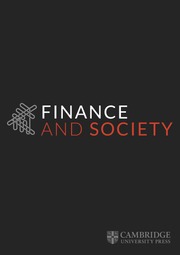Article contents
Recovering the mundane practices of economic time
Published online by Cambridge University Press: 09 November 2023
Extract
How exactly did the neoliberal imaginary that Konings describes gain so much traction? Was its speculative temporality smoothly translated into practice from the writings of Hayek and others as he suggests, or was its production a messier, more contested, and more contingent affair? In this brief commentary, I go back to one of the key historical moments that he examines, the Volcker shock of 1979-82, and examine some of the more mundane political and technical struggles that defined the early Reagan Administration’s efforts to put the neoliberal speculative logic into practice. By revealing the often-flawed material efforts that go into producing speculative temporalities, I argue that such struggles might allow us to arrive at a less teleological account of the resilience of neoliberalism.
- Type
- Forum: Capital and time
- Information
- Creative Commons
- This is an Open Access article, distributed under the terms of the Creative Commons Attribution-NonCommercial-No Derivatives licence (http://creativecommons.org/licenses/by-nc-nd/4.0/), which permits noncommercial re-use, distribution, and reproduction in any medium, provided the original work is unaltered and is properly cited. The written permission of Cambridge University Press must be obtained for commercial re-use or in order to create a derivative work.
- Copyright
- © 2018 The Author(s)
References
- 2
- Cited by


